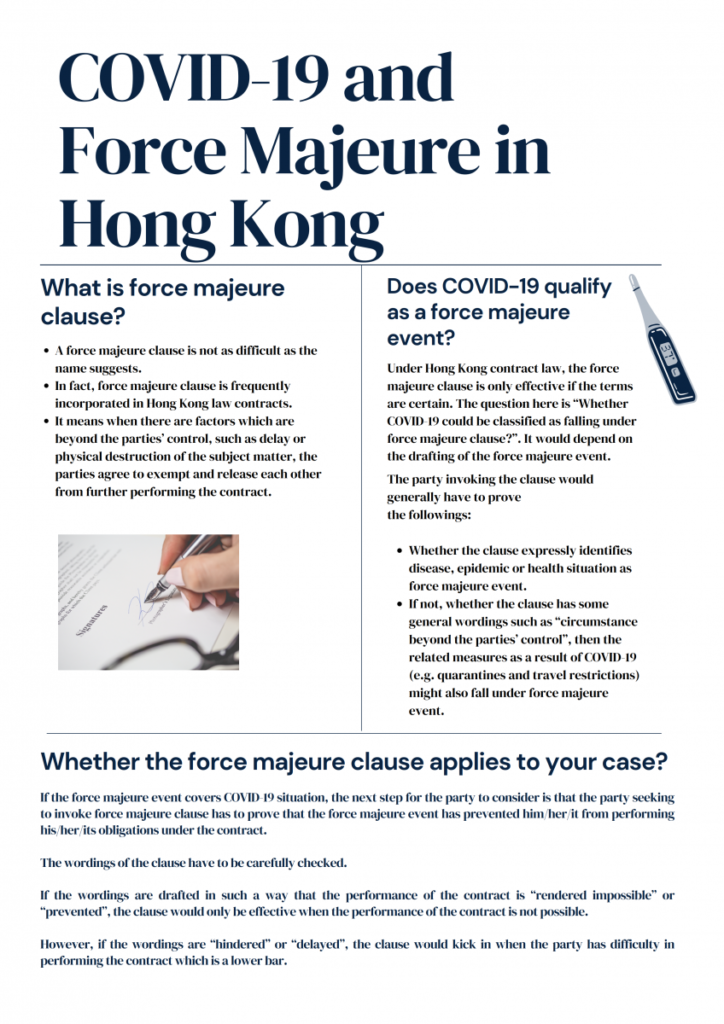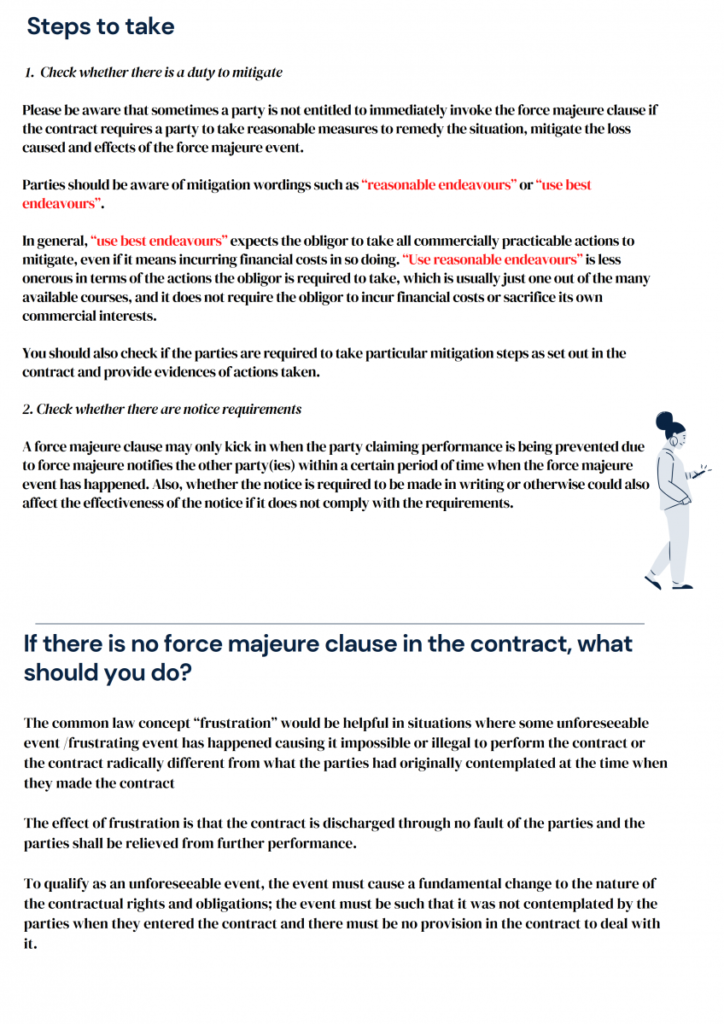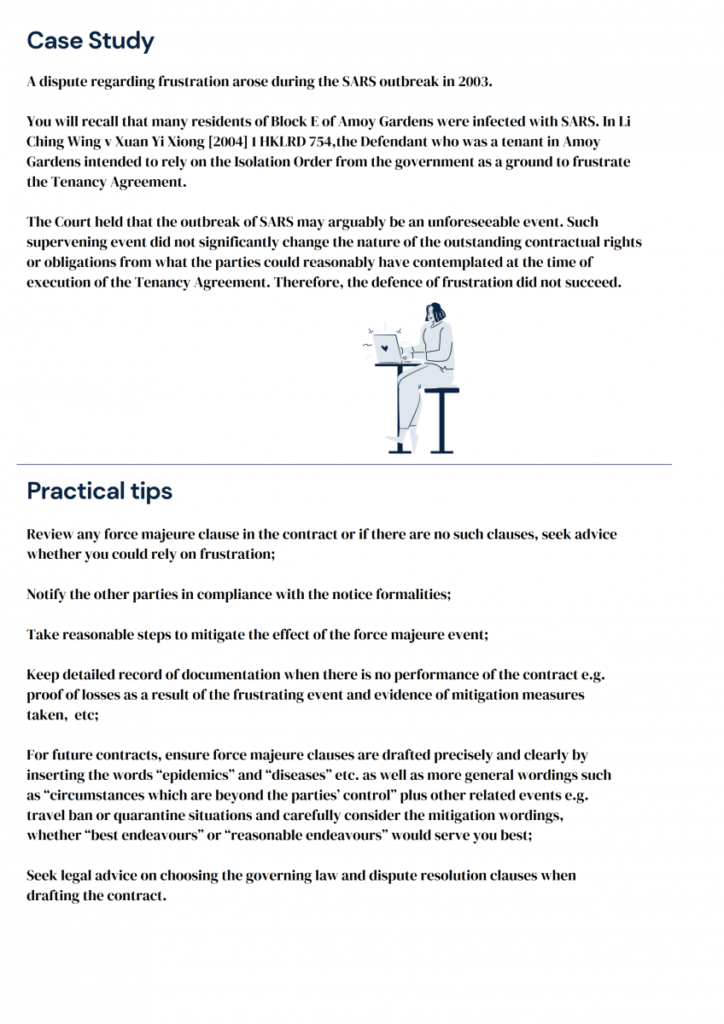


 香港中環雪厰街二號聖佐治大廈五樓503室
香港中環雪厰街二號聖佐治大廈五樓503室 +852 2868 0696
+852 2868 0696










Suite 503, St. George's Building,
2 Ice House Street, Central, Hong Kong




最近在《南華早報》上發表的一篇文章(於2020年9月19日發表在《亞洲周刊》增刊上)引起了我的關注。2016年,在中國四川省遂寧市,一位母親推著嬰兒車出門,載著她的12個月大的嬰兒。突然,一個用於手部鍛煉的金屬球,在附近樓宇從天而降,擊倒嬰兒,並導致該嬰兒死亡。
事後當局進行調查,但並沒有找到肇事者。即便如此,該家庭還是向涉事樓宇內的所有業主提起訴訟。此案最終在船山區人民法院開庭審理。經審訊後,法院裁定該樓宇的所有業主均應負上責任,並責令他們共同賠償損失。
根據《侵權責任法》第八十七條規定,「不明拋擲物、墜落物損害責任糾紛」,適用過錯推定原則,即只要業主或房屋的使用人不能舉證證明自已沒有過錯,則推定其有過錯。法庭認為此舉證原則適用於該樓宇的所有業主。
即使只有一所住戶可以犯下涉事行為,但法官指出,平衡各方利益,法律應保護弱者,從而達到賠償受害者的目的,並向社會傳達警號。樓宇中的每個業主均被責令賠償人民幣3000元。換句話說,真正的罪魁禍首逍遙法外,逃過法網,避開面臨數十萬元罰款和最高一年監禁的刑期。無容置疑,判決引起其他無辜業主的不滿。
此案受到了內地網民的熱烈關注和評論。雖然沒有人會否認嬰兒的家庭應該得到賠償,但對無辜的人追究責任和懲罰明顯是不公平的。很多人指責警察在調查此案失職,包括提出以下質疑:1)當局有否對金屬球進行了指紋識別?2)當局有否在每個公寓中搜索並嘗試尋找匹配的金屬球(金屬球通常以一對形式運作)?3)由於一般都是較多老年人使用金屬球,用作按摩之用,當局有否對該樓宇的老年住戶進行額外調查和蒐證?有些人將此判決批評為二流司法,也有些人指法院逃避問題。
對來自西方的讀者來説,僅僅為了不讓真正肇事者逃出法網,而採取寧枉毋縱的原則,令人嗤之以鼻。這讓我想起了第二次世界大戰期間,納粹德軍採取的一種報復行動。為了不讓殺害德國士兵的肇事者逃之夭夭,他們往往不惜把整條村莊的人全部處決。
但從另一個角度而言,此判決真的可以與卑鄙的納粹戰術相提並論嗎?追究涉事責任,讓肇事者承擔責任,同時讓受害者獲得應有賠償,絕對符合公共利益。可能只有這種政策性的判決,才能使大廈管理人員改善安全措施,並對大廈安全更加謹慎。
然而,在這種情況下採取過錯推定原則,也不無可取之處。無辜的住戶不難滿足此舉證責任。一定有很多住戶在案發時間不在他們的住所,並能提出相關不在場證據,包括目擊證人。無辜的住戶也可以證明自己從未擁有或使用過這種金屬球。
從法律的角度而言,雖然香港奉行無罪推定原則,可是,實際上,法庭往往採取過錯推定原則。幾乎所有針對政府公務員的公職人員行為失當的控罪,只要證明到他們的銀行賬戶上有太多資產,而超出他們條件容許所獲得的資產,便往往已經能證明他們受賄了。在英國,在收受或處理黑錢的控罪,法律假定所涉金錢或財產皆為犯罪得益,除非被告能證明相反的情況。
這些過錯推定原則是為了公共利益。這些推定不僅使所有遭受不法行為的受害者得益,更對整個社會有莫大裨益。這些原則不僅幫助上述遇到人生巨變的父母,也能幫助我們每一位。
内容摘要:
• 香港在内地大灣區規劃中可發揮重要作用
• 香港走出逆境的能力不應被低估
• 香港的連串示威和遊行表明對住房、青年就業和特區政府管治等問題不滿,而這些問題不一定與内地有關。
• 短期內,投資者和有意移民的人士可能會對沖他們部分在港投資,但不會短期内從香港撤資。
• 隨著中美貿易戰改變了全球政經格局,全球地緣政治發展將對香港的長期前景更具決定性。
• 市場仍需觀察國家安全法的具體執行情況
• 只要企業治理,法治,資本自由流動維持現狀,香港作為亞洲金融中心的作用將繼續穩固。
主持人:
與會講者:
網絡研討會主題:
-最新環球地緣政治局勢和經濟走向
-香港在中美貿易戰中的角色
-相對於主要競爭對手,上海,深圳,東京和新加坡,香港作為環球金融中心的競爭力。
高國峻律師在網絡研討會開首指出,時移世易,我們必須認清社會變革,包括科技、政治和氣候等各個方面,變革速度來得比往日爲快。尤其,香港的社會變化來的特別快。因爲香港發生連串示威和香港捲入中美貿易戰中,客戶會希望知道香港的未來將如何發展。
高國峻律師:
香港、上海和深圳是否都屬於國家總體規劃的一部分?香港是否應該與上海和深圳有更多融合和交流,從而同時壯大三地的發展?
卓百德先生:
部分私人投資可能會撤出香港,但隨著大灣區的發展,香港作為集資中心的地位只會越見鞏固。我們不應低估内地執行大型政策措施(如設立深圳經濟特區)的能力,亦不應低估香港邁入下一個發展階段的能力。四十年前,香港大約有100萬人從事製造業。如今,只剩大約20-30萬人從事製造業。香港的發展經歷了許多周期。只要香港的法治,法律制度,企業治理和資本自由流動保持現狀,並沒有重大改變,香港才能繼續發展。大灣區可能會發展出類似紐約證券交易所/納斯達克/芝加哥商品交易所的三元交易所。由於内地投資者高度重視香港的資本自由流動,香港可以從衆多城市突圍而出。
Connie Bolland 小姐:
從歷史上看,香港的經濟產業轉型相當成功,成功從以製造業為主導轉型成金融中心。可是,中國(深圳)綜合開發研究院發布的《全球金融中心指數》目前將香港排在第六位,排在紐約、倫敦、東京、上海和新加坡之後。因此,我們不可以輕言說上海並不是我們的競爭對手。
香港擁有來自內地以及世界各地的資本投資,龐大的交易量,蓬勃的發展機會以及良好的人力資本。
雖然與上海和深圳的競爭日益增加(尤其深圳銳意發展為科技中心),但香港仍能吸引內地以及其他國家的科技公司來港上市,集資發展業務。新加坡則是主要吸引印尼和越南的初創公司到其交易所上市。而東京主要吸引日本的公司到其交易所上市。縱觀整個亞太地區,對比各個資本市場,香港仍然擁有一個較為蓬勃和成熟的資本市場,於市場份額中處於領先地位。
高國峻律師:
您對香港交易所作為粵港澳大灣區發展規劃的一部分有可看法?市場會否擔憂香港將不再擁有高度自治,從而引發信任危機?
沈旭暉教授:
作為一個土生土長香港人,我對香港前景感到悲觀。內地試圖套用新加坡模式作為治港藍圖。可是,國際社會對此回應不但並非為正面,更對此採取嚴厲的態度。
市場一般期望美國只會採取較為象徵性的制裁。可是,現在美國已經進行第二輪甚至第三輪的制裁,這將影響香港的經濟以及銀行業。市場和投資者可能不再相信香港與內地有實質區別。他們可能會把資金轉移至東京,但這並不會再在短期內進行,至少需要4-5年的時間。短期內市場可能會開始對沖,分散在香港的投資。市場認為香港一貫實行的規則和慣例正在改變。由於投資者有眾多的選擇,他們現在可能會進行對沖,並分散在港投資,而選擇投資其他地方,例如東京。
高國峻律師:
香港的遊行和示威衍生暴力,也令人不安,遊行和示威的背後成因為何?
沈旭暉教授:
泛民主派需要負上部份責任。可是,政府一直未能解決香港的房屋和生活成本高昂的問題。香港是全球居住成本最高的地方之一。從2009年開始,房屋價格增長了280%,但整體薪酬卻沒有錄得同樣升幅。扣除通貨膨脹等因素後,實際收入實際上下降了。教育成本高昂、醫療質素下降也是問題成因之一。香港市民有權要求基本的經濟和生活條件。
Connie Bolland 小姐:
同意,遊行和示威是由於行政長官是由缺乏認受性的選舉產生,而不是按照《基本法》所期許的普選產生。泛民主派需要負上部份責任。但與此同時,政府在多個範疇都不願進行改革,回應民意。政府同時未能讓社會各方進行有意義和有建設性的對話,同求出路。由於住屋價格連年上升,市民整體居住質素有所下降。與此同時,青年就業也是一個重大問題。雖然整體失業率為6%,但目前青年的失業率已經超過10%。這些青年大多受過良好教育,渴望貢獻社會。除此之外,政府最大敗筆為處理人口問題。自1997年以來,在大量移民湧入的情況下(大概200萬人),政府沒有推出相應的政策措施。因此,市民普遍對此感到不滿。雖然旅遊業能拯救本港經濟在2003年非典危機面對的低谷,但旅遊業同時亦帶動租金上升,市民的生活成本因此日益增加,引起不滿。上述所有社會問題所引起的民憤便一併爆發出來。
高國峻律師:
40年以來,從來沒有一屆政府比現屆政府更為不力、更為缺乏想象力。行政長官自己承認只擔當行政職務。市民希望政府能有所作為。您對此有何看法?
沈旭暉教授:
我們對於政府目前管治模式感到憂慮。市民期望「一國兩制」能有效實行。隨著中央政府對參與香港管治的信心日益增強,一個與市民期望有所不同的治港模式正在衍生。
我清楚地記得,2008年在北京舉行奧運會時,香港人為自己作為中國人的身分而感到自豪。香港現時已出現取態上的重大分歧。實際上,香港局勢本來並不那麼嚴峻,可是,政府並沒有採取任何回應市民需求的政策。隨著事態發展,參與遊行的市民不限於生活環境惡劣的人,而有更多中產階級和學生參與。這些人大多受過高等教育(包括那些曾經在外國留學的人),他們並沒有面對居住環境變得惡劣的問題。房屋問題確是一個嚴峻的問題,但遊行和示威同時將社會上不同界別的人連合在一起。我敢說,即使建制陣營也對國家安全法有所不滿。
高國峻律師:
現時尚未有法庭判詞解釋國家安全法,所以現時審視國家安全法的實施似乎言之尚早。其實特區政府從1997年開始已經有機會就國家安全立法。可是,由於特區政府未能就國家安全立法,所以中央政府便為香港就國家安全立法。每個地區都需要應對恐怖主義和分裂行為,今次立法有何不同?
沈旭暉教授:
殖民地時期的煽動罪一直存在。再者,今天其他國家也有自己的國家安全法。現在的主要問題是,特區政府在1997年之後的 23 年都未能就國家安全立法。可是,北京政府單方面為香港就國家安全立法。此舉甚至超出了部份建制派的預期。我的同事身處世界各地,不論身處美國還是英國,現在都必須採取適當的預防措施。國家安全法的條文也是一個問題。我們可做與不可做的界線非常模糊。任何個人行為都可以隨意被起訴,因爲當局尚未劃清行為和言論的紅線。希望在一兩年後,我們會了解更多。
高國峻律師:
市民都渴望穩定性,同時亦用他們雙腳投票。在 1997 年之前,不少香港人去了溫哥華,但 99% 的人最後都回來了。唯一的結果就是溫哥華房價暴漲。這次會有所不同嗎?
James Hartshorn先生:
是的,移民到其他國家的人數肯定會激增,但目前實際上只有一小部分人正在辦理移民。例如,我們發現 300 名持有移民簽證的人中,只有 20 人移民到海外。市民都將移民視為一種安全機制、一種後備計劃。近代史上曾出現過三大移民潮,天安門事件後、1997 年回歸前和現在。
在 2020 年 5 月的高峰期,我們發現曾經有 41,000 人次在線搜索「移民」一詞。我們有 50 名來自香港的客戶移民到愛爾蘭。目前的情況來看,愛爾蘭是較鮮為人知的移民目的地之一,而加拿大則是最著名的移民目的地。市民目前對英國就英國國民海外護照(“BNO”)的最終政策抱持觀望態度。BNO持有人會被允許在英國居住 6 個月或更長時間嗎?有多少人會真的選擇移民到英國?上述一切都充滿不確定性。
高國峻律師:
今天的聽眾大部分都是法律界人士,他們的客戶不少都是基金或在香港進行各類的商業活動,他們應該擔心未來的局勢嗎?
Connie Bolland 小姐:
香港美國商會最近的一項研究顯示,在接受調查的 180 家公司中,有 77% 的公司擔心國家安全法,因為此法的具體執行含糊不清。因此,儘管大多數人都不會立即離開,但不少人仍然抱有憂慮。在接受調查的人士中,53% 的人有應急計劃,而66% 的人對前景感到悲觀。
沈旭暉教授:
雖然很多人說要離開香港,但這裡的白領薪酬較高,令不少人卻步。許多在職人士寧願留在香港工作,而將他們的妻子和兒女送到海外。這種模式將繼續下去。一些投資將會轉移到海外的其他市場,但一般在職人士將在香港留最少兩到三年,而未有逼切移民需要。中央政府將繼續努力吸引國際投資者來港投資。我認為,我們現時已經非常接近「一國一制」的制度,所以短期內北京會嘗試讓內地企業來港上市,從而為這裡的美國投資銀行家提供就業機會。主要的不確定性其實在於全球地緣政治局勢。中美脫鉤會成為現實嗎?中美脫鉤將如何發生?中美關係已經過了不歸路。在過去的十年中,中國企業在美國進行了大量投資。我們必須密切留意全球地緣政治局勢,以了解長期趨勢。
高國峻律師:
我們不單需要面對示威、新型冠狀病毒和國家安全法的衝擊,我們還需應對中美貿易戰的挑戰,因為我們不再被視為與內地有區別。香港在這一切中將扮演什麼角色?
卓百德先生:
現時一切發展都非常微妙。這一切都始於美國和特朗普,但歐洲都加入了與中國競爭的行列。中國的不公平貿易行為和不符合世貿組織期望的行為令人驚奇。特朗普現時專注與中國競爭。整個世界現時都觀望美國的行為。歐洲理事會本週發表了一篇嚴厲抨擊中國貿易政策的文件。此舉與美國無關。無論中國會否採取反制措施,香港都難免成為夾在中間的磨心,不論香港一直以自由貿易中心運作與否。我們將密切留意美國大選的結果,觀看新一屆政府的對華政策。
高國峻律師:
如果你認為你在香港什麼都做不了,這會不會是一種過於簡化的看法?北京大可以說,香港已經享有高度自治。北京也可以說他們從來沒有干涉香港事務,即使香港曾經發生暴力的示威活動。我們應該在香港做些事情,為市民帶來希望和光明的未來。
卓百德先生:
我們樂見香港領導階層表現出一些領導力。港區國家安全法源於中央政府認為特區政府不能有效處理內部事務,所以需要中央政府就此立法。也許他們有一個很好的觀點。
沈旭暉教授:
香港對內地的的重要性被低估了。香港對內地的重要性不能只從GDP反映,而是香港作為內地外匯中介的角色,此角色暫時仍未被其他內地城市取代。如果我們有更好的政府,香港仍然可以發揮重要作用。香港與其他身處海外的港人較為富裕,亦擁有緊密的網絡,能夠建立第二經濟體來維持香港的經濟。香港長遠仍有前景。
Connie Bolland 小姐:
香港必須確保資本市場保持自由和開放,並鞏固健全的法治。這兩點與良好的企業管治將阻止香港的作用被削弱。1967年香港暴亂期間,當年我還是個小女孩,親歷屋頂上設有機槍的情境。騷亂過後,麥理浩總督徹底改革了香港的基礎設施和醫療體系,以改善民生。海底隧道便是那個時代的產物。現在我們有什麼東西可以給予和提供?領導階層需要就此思考,並提出創新的觀點。
James Hartshorn先生:
過去一直有關於上海取代香港的傳言,但這將不會發生。香港享有健全的法治和新聞自由。就目前的情況而言,資本的自由流通將不會有任何限制或改動。香港的財政狀況讓各地政府羨慕,此情況將不會有特別大的改動。
高國峻律師:
今天的研討會到此為止。我們將密切留意內地有關香港的政策法規。北京政府擁有務實、耐心的計劃。例如,北京現在進行最大規模的空氣淨化,以改善污染情況。
我記得一句古老的格言,到達破產法庭的最快方法,便是聽取專家的建議。本次網絡研討會的目的不是要給出任何答案,而是為聽眾提供一些深入的背景知識,以做出更佳的商業決策。感謝今天所有參與的與會講者。
高李嚴律師行是一家總部位於香港的律師事務所,擁有 40 名律師,在上海設有辦事處。它是 Globalaw 的創始成員。Globalaw 是一個領先的全球專業網絡,於 1994 年創建,由 85 個司法管轄區的 110 家律師事務所組成,宗旨為提供個性化的法律服務。
This is the third in a series of articles where we examine recent trends in Family Law issues which have a broad impact on the community. The initial article discussed recent developments in divorce law and procedure in England and Wales regarding “no fault” divorce. We then looked at litigation funding and maintenance payments for children of unmarried parents. Here, we examine the enforceability of prenuptial agreements in Hong Kong.
It is now ten years since the leading case in England and Wales (Radmacher v Granatino [2010] UKSC42) changed the way in which courts had historically treated prenuptial agreements. Four years later the courts in Hong Kong adopted the principles set out in Radmacher as law in a case which went to the Court of Final Appeal (SPH v SPA [2014] HKFLR 386). In the absence of any further legislative development, these two cases are still important landmark decisions. Lawyers in our team are often asked whether prenuptial agreements are binding in Hong Kong and unfortunately this is not a question which can produce a simple Yes or No response. The quick answer is that a clearly drafted prenuptial agreement will be considered by a court in Hong Kong in the context of all the surrounding facts of the case; however, the court has ultimate discretion on matters regarding financial provision in divorce and will not simply “rubber stamp” a prenuptial agreement if it believes that doing so would result in an outcome it perceives as unfair or which leaves one party in “a predicament of need”. We will look in more detail below at the current law, and what steps can be taken by a couple considering entering into a prenuptial agreement to ensure the best chance of it being upheld.
A point to note at the outset is that common law jurisdictions such as Hong Kong and UK take a very different approach on this issue to many civil law jurisdictions which have well established marital property regimes and where the community at large often has a significantly deeper acceptance and understanding of a prenuptial agreement. A court in Hong Kong would likely uphold an agreement entered into in a marital property regime jurisdiction where the parties could show that they understood the full implications of the agreement. This is especially so if an agreement is signed in a country where it is commonplace practice and drafted simply and clearly – even if no legal advice is taken at the time by either party. This is clearly seen in the Radmacher decision as set out below.
Before Radmacher, prenuptial agreements were generally not enforced on the public policy grounds that they “undermine the concept of marriage as a lifelong union”.
Radmacher involved a wealthy German heiress, Katrin Radmacher, and her French investment banker turned academic researcher husband Nicholas Granatino. They had entered into a German law governed prenuptial agreement which the husband subsequently sought to have set aside. The Supreme Court held that on the facts of the case it was fair to require the parties to adhere to the agreement they had made based on, among other points, the husband’s relative financial sophistication notwithstanding that the husband did not have separate legal advice and the agreement was drafted by a German notary who was accustomed to acting for the Radmacher family. The judgment also provided detail on how the court should consider “fairness” both from the perspective of procedural fairness (eg was the less wealthy party coerced into signing without independent advice in rushed circumstances?) and substantive fairness (eg would the less wealthy party be left in a “predicament of real need” if the agreement were strictly enforced?). Radmacher is so important because for the first time the courts determined that, although a prenuptial agreement is not automatically binding on a husband and wife, it may be upheld if it can be shown that it was “freely entered into” and “with a full appreciation of its implications”.
In recent years, the key cases in England and Wales have generally followed the Radmacher approach whilst providing more guidance and detail on issues such as how a court would treat agreements entered into under marital property regimes (eg Z v Z [2012] 1 FLR 1100, which we touch on below), the relative importance of legal advice given (or not given) at the time the agreement was created, and the degree by, and circumstances which, cause the courts to consider the less wealthy party’s “needs” and ultimately what is fair. Z v Z is an interesting example of a French prenuptial agreement which arose in divorce proceedings in London. After cohabiting for five years, the couple entered into a “separation de biens” marriage contract which on its face excluded the concept of sharing of any property – from before or during the marriage – between the couple. All the formalities of the contract were entered into correctly, the contract was not at all unusual in the context of the families and the wife understood the nature of the contract when she entered into it. The husband sought to rely on the agreement, asserting that a 50:50 split (the likely ratio to be awarded in an English court not taking the prenuptial agreement into account) was inappropriate, and that he argued that his wife’s needs would be well met if she were to take a 35% share of the marital asset pool, which was approximately GBP15,000,000 (HKD150,000,000) and all generated during the marriage by equal contribution. The wife asked for a 50% share based on her equal contribution to the 14 year long marriage and five year prior cohabitation. The Judge determined that, based on the legal principles outlined in Radmacher and the overall facts of the case, it would be fair to depart from equality to reflect the agreement, and awarded the wife 40% of the pool.
Finally, a very recent case in England, S V H [2020] EWFC B16, serves as a cautionary note and a useful reminder of the potholes which can arise. This case involved a couple each entering into their second marriage, and signing a prenuptial agreement prepared by a foreign notary five days prior to the wedding outside the UK. Neither party took independent legal advice, nor did they make any financial disclosure to each other. After the marriage broke down, the wealthier and younger wife sought to rely on the agreement whilst the husband argued that it should not be upheld on the grounds that it would drastically limit the amount of support he would receive. The judge (HHJ Booth), exasperated by each parties’ conduct in the case, concluded “In my judgment there is no value in the prenuptial agreement. There was no formal process of disclosure, there was no advice given to either party, other than by the notary who prepared the document and at five days before the ceremony”. As a result, the judge disregarded the agreement and awarded the husband both an income award and a property on trust (to revert to the wife on his death).
SPH, the leading case in Hong Kong, involved a divorce between two German nationals who had signed a prenuptial agreement in Germany before marrying in Hong Kong the following year. The couple disputed whether the divorce should take place in Germany or Hong Kong, and the husband applied to the Court of Final Appeal to seek to persuade the court in Hong Kong that Germany was a more appropriate forum, but he was unsuccessful. The Court of Final Appeal used the opportunity to review the applicable law relating to prenuptial agreements and it subsequently adopted Radmacher as good law in Hong Kong.
In the five years since SPH there have been few cases dealing with prenuptial agreements which have been adjudicated by the courts so the law in Hong Kong has not developed very far from Radmacher. One recent case (LCYP v JEK [2019] HKCFI 1588) is however helpful. LCYP concerned a divorce between a US born husband and a Hong Kong born wife who were married in New Jersey, USA, having previously entered into a prenuptial agreement governed by New Jersey law. In the course of the over 20 year marriage, the couple had become very affluent from a somewhat modest starting point. The issue which concerned the court related to ancillary relief (i.e. financial provision for the wife), and in particular the weight which the court should allow for an unvitiated prenuptial agreement. In this context, an “unvitiated agreement” describes an agreement which is clear and straightforward, and not flawed in any way. HH Chan J confirmed that SPH was still the guiding case, and he also quoted extensively from Radmacher to review how the court should consider concepts such as “need”, “fairness”, “autonomy” and “future circumstances”. Based on the legal principles outlined in both Radmacher and SPH on the one hand, and the facts of this particular case on the other, the Judge commented “I do not believe that the law requires the court to quantify the amount of weight to be attached to an unvitiated prenuptial agreement. In this case, it would not be right to attach no weight to [it]. On the other hand, it would be wrong to place great weight on it because it would be unfair to do so”. He further added “The couple were young at the time of entering the [prenuptial agreement]. The circumstances had changed in a way which they did not anticipate. In particular, the financial landscape at the time of breakdown of marriage was vastly different. The advancement of the family’s standard of living had much to do with the sacrifice of the wife. She is now left in a much disadvantaged position having given up the opportunity to develop her career for the sake of the family. It is simply wrong for her to be held to the terms of the [agreement] whilst the husband got to keep the fruit of her sacrifice”. HH Chan J’s decision provided the wife with considerably greater financial provision than the prenuptial agreement contemplated.
As set out above and in Radmacher, the requirements for enforcement of an agreement prepared in a marital property regime jurisdiction are significantly different for an agreement prepared in common law regimes such as UK, USA and Hong Kong. What are the key takeaways from the case law which would demonstrate to a Hong Kong court that a prenuptial agreement entered into in UK, USA or Hong Kong is both procedurally and substantively fair, and hence more likely to be upheld?
We regularly advise international and Hong Kong based clients on issues arising from prenuptial agreements. Stephen Peaker, the Head of the Family Law Department, acted for the wife in SPH, the leading case in Hong Kong, at the Court of First Instance ([2012] HKFLR @52-69), and is currently acting on a case representing a client seeking to set aside a financial consent order for failure to disclose a new relationship which induced him not to rely on a prenuptial agreement from a marital property regime jurisdiction (GM-SA v DMP-J [2017] HKFLR @ 513-). This case is markedly different from LCYP (which featured an agreement prepared in New Jersey, USA and which would therefore need to satisfy the items flagged above in Key Practical Points), and is rather the same type of agreement, and follows the same legal principles, as Radmacher.
This is a subject which needs to be approached with care. There is clear case law precedent available to guide the courts on legal principles but facts nevertheless play an important role. If the supporting fact pattern is generally in line with the points outlined in Radmacher on the issue of the application of the prenuptial agreement in a marital property regime jurisdiction or in “Key Practical Points’ above, as the case may be, then the court will in all likelihood uphold an unvitiated prenuptial agreement.
September 2020
Stephen Peaker, Partner and Head of Family Law
Michael Openshaw, Consultant
Family Law Department
Oldham, Li & Nie
This article is for information purposes only. Its contents do not constitute legal advice and readers should not regard this article as a substitute for detailed advice in individual instances.
高李嚴律師行躋身Asialaw 2021年領先律師行列
Asialaw已宣佈它們2021的領先律師,而我們很高興地宣佈高李嚴律師行再一次榜上有名。
恭喜以下合夥人獲得評選!
關於Asialaw領先律師
Asialaw領先律師評選出傑出的私人執業法律專業人,並於上述18個業務領域和24個司法管轄區中被劃分為市場領先者,領先者和冒起之星。Asialaw諮詢法律服務的“買家”以及對市場有深入了解的私人執業律師。有關更多Asialaw領先律師的詳細資料,請參見此處。



假期通信
由於公眾假期,我們的中國和香港辦事處將在以下日期關閉。
| 辦事處 | 辦事處關閉 | 恢復工作日期 |
| 中國辦事處 | 2020年10月1-8日 | 2020年10月9日 |
| 香港辦事處 | 2020年10月1-4日 | 2020年10月5日 |
請注意,2020年9月27日星期日和2020年10月10日星期六在中國是工作日。在這段時間內,有關中國商標事項的終止日期不能替換。
如有緊急情況,請通過電子郵件發送至ip@oln-law.com,或通過短信發送至(852)60282100。謝謝。
This website uses cookies to optimise your experience and to collect information to customise content. By closing this banner, clicking a link or continuing to browse otherwise, you agree to the use of cookies. Please read the cookies section of our Privacy Policy to learn more. Learn more
香港中環雪厰街二號聖佐治大廈
五樓503室
請在此處分享您的訊息的詳細資訊。我們將盡快與您聯繫。
